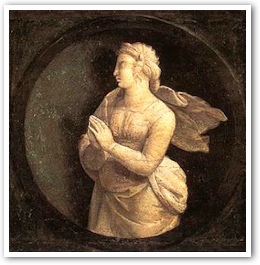The Son Is Equal to the Father
- FR. KENNETH BAKER, S.J.
Since many heretics (particularly the Arians) in the early Church denied the divinity of Jesus Christ, the Church in her Creed or rule of Catholic Faith pays special attention to the procession of the Son from the Father.
 |
The Son or Word (cf. Jn 1) proceeds from the Father by intellectual generation. This means that the thought or the Word of the Father is a perfect image of himself. This Word, however, is not separate or distinct from the Father, since his thinking is identical with his existence.
Some early Christians thought that the Son of God was a creature or instrument of the Father, but not literally God. In order to reject that error the Church professes in her Creed that Jesus Christ, the eternally begotten Son of the Father, is God from God. Thus the Son is perfectly equal to God the Father in essence and being. There is no subordination in being of the Son to the Father. Just as the Father is eternal, so also is the Son. Just as the Father is all-powerful, so also is the Son, and so forth. Jesus Christ, therefore, is not the first creature produced by God the Father. He is rather his externally only-begotten Son. Jesus is also the perfect image of his Father, having in himself no defect or imperfection. In our experience as artists and builders we always find defects and a lack of correspondence between what we would like to make and what we actually produce. Thus, the painter is frequently dissatisfied with his painting because it does not measure up to the idea (e.g. of the Virgin Mary) that he had in his mind. In order to make it clear that there is no imperfection of this kind in the correspondence between the Son and the Father, the Church proclaims also that Jesus Christ is light from light. Because of the role of the sun in human existence and because of the purity and power of the light of the sun, the Church uses the example of light to exclude all notion of imperfection in the relationship between the Father and the Son.
What proceeds from another can also fail to equal the latter's reality because of some deficiency in truth; that is, it does not truly receive the same nature as the original but only imitates it in some way. Thus a picture of Pope John Paul on television is not the same thing as the Pope himself. It is only a likeness of him. To exclude all such deficiency from the divine generation of the Son, the Church adds to the rule of Catholic faith: true God from true God.
Since God's intellectual activity is identified with himself, it follows that he naturally understands himself. The object of his thought is not something outside of himself something distinct from himself; rather, it is his own essence. Therefore, his Word or thought proceeds from himself naturally, as a father naturally generates a son. What we are saying here is that the Son is not produced artificially, as happens in the case where a man builds a boat or an artist paints a picture. Thus, in order to exclude the error of thinking that the Word of God proceeds from God not by way of nature, but by the power of the divine will or in any other way, the Church adds: begotten, not made.
Accordingly, the above four phrases in the Creed refer to the same reality in different ways, namely, that the Son is equal to the Father and therefore is God in the full sense of the word.
See the index of chapters from Fundamentals of Catholicism which have been reprinted to CERC here.
 This is Meaghen Gonzalez, Editor of CERC. I hope you appreciated this piece. We curate these articles especially for believers like you.
This is Meaghen Gonzalez, Editor of CERC. I hope you appreciated this piece. We curate these articles especially for believers like you.
Please show your appreciation by making a $3 donation. CERC is entirely reader supported.

Acknowledgement
Kenneth Baker, S.J. "The Son Is Equal to the Father." In Fundamentals of Catholicism Vol. 1 Chapter 13 (San Francisco: Ignatius Press, 1995), 47-49.
This article reprinted with permission from Father Kenneth Baker, S.J.
The Author

 Father Kenneth Baker, S.J., assumed editorship of Homiletic & Pastoral Review in April 1971 and remained in this position for almost forty years. In 1983 he published a three-volume explanation of the faith called Fundamentals of Catholicism Vol. 1, Creed and Commandments; Vol. 2, God, Trinity, Creation, Christ, Mary; and Vol. 3, Grace, the Church, the Sacraments, Eschatology
Father Kenneth Baker, S.J., assumed editorship of Homiletic & Pastoral Review in April 1971 and remained in this position for almost forty years. In 1983 he published a three-volume explanation of the faith called Fundamentals of Catholicism Vol. 1, Creed and Commandments; Vol. 2, God, Trinity, Creation, Christ, Mary; and Vol. 3, Grace, the Church, the Sacraments, Eschatology


